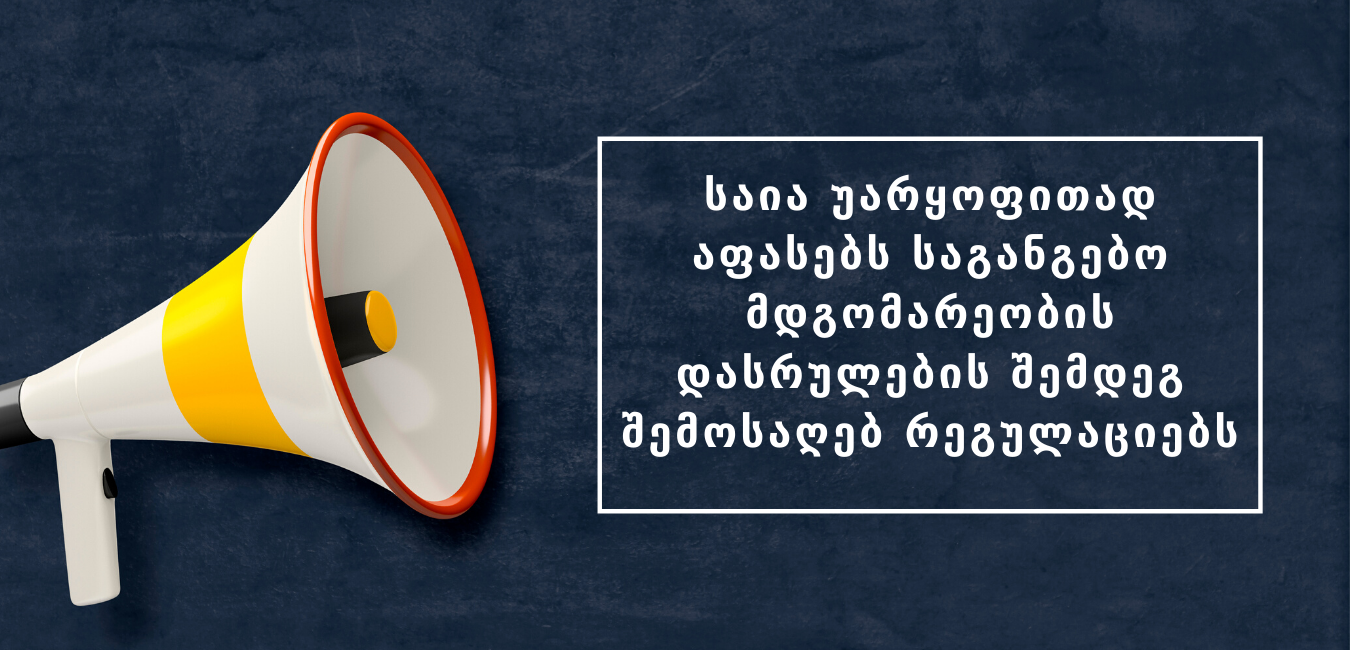


On May 13th, a legislative initiative of Dimitri Khundadze, Ilia Nakashidze, Vladimer Kakhadze, Zurab Khachidze, Koba Nakaidze, and Dimitri Mkheidze, members of the Committee on Health and Social Affairs (N07-3/450) on amendments to be taken to the Law of Georgia on Public Health was presented to the Georgian Parliament. According to the explanatory note to the bill, its initiation is due to the fact that the Georgian government, even after the cancellation of the state of emergency, shall be able to take appropriate measures to combat the outbreak of pandemic and the extremely dangerous epidemic for public health.
For this purpose, the definition of the term "quarantine measures" is changed and in addition to the specific measures which is applied to a person, it is possible that the work of the public institutions, the movement of persons, property, labor, professional or economic activities, illegal migration/ international security, assembly of natural persons with a purpose of a social event are arranged differently from the assembly legislation including imposing appropriate restrictions. The bill also stipulates that the quarantine rules are determined by the Government of Georgia or the Ministry authorized by it.
We believe that although adoption of appropriate regulations to tackle the spread of the novel coronavirus serves the legitimate purpose, the power of restriction of rights to be transferred to the Georgian government indicated in the bill does not comply with the standard of the Constitution of Georgia and the above restrictions should be made only in accordance with the law. It should also be noted that the bill allows for the restriction of the specified rights in disproportionate volumes and is not focused on the need for a specific case.
The necessity of restriction of the right by law – for the restriction of the freedom of movement and property rights, the Constitution of Georgia directly requires that this be done in accordance with the rules established by law. Although the constitution does not include such a direct provision on restriction on labor and freedom of economic activity and the right to assemble, however, as a threshold established by the Constitution to limit the right, as well as the standard of the Convention for the Protection of Human Rights and Fundamental Freedoms requires that the restriction of the rights shall be done in accordance with the law, with such a legal document, which has been adopted with high legitimacy and wide public involvement. In this case, the by-law of the normative act cannot be such a document.
Proportionality of Restriction of Rights - The bill allows that the right to restrict movement, property, labor, professional or economic activity and freedom of assembly is transferred to the government, which gives it the authority to restrict the named rights. In particular, the government will be given the right to impose restrictions even in areas that may not be the epidemic focus or an area posing a threat. It should be noted that article 12 of the Law on Public Health already establishes the possibility of imposing appropriate restrictions on the epidemic focus, and equipping the executive branch with additional powers is contradicting the principle of proportionality of the restriction of rights.
It should not be overlooked that according to the amendment to the Code of Administrative Offenses of Georgia violating the quarantine rules will result in a fine of GEL 2,000 for a natural person, GEL 10,000 for a legal entity, and criminal liability shall be imposed for repeated actions. Under the circumstances, when amendments of the Administrative Code and the Criminal Code of April 23rd, 2020 is an issue and the principles of fair trial of a case and clarity of norms are not observed, granting this authority to the Government of Georgia increases the possibility of unjustified interferences in this rights protected by the Constitution.
The legislative package also envisages amendments to be taken to the Criminal Procedure Code, according to which it is possible to carry out criminal proceedings remotely if there is a danger of the outbreak of a pandemic and a spread of extremely dangerous epidemic for public health.
As you know, in case of emergency, sessions are held in a remote mode, and attending these types of sessions is problematic and often impossible.
In a state of emergency, GYLA could not monitor the court hearings in the Tbilisi City Court from March 21st to May 4th period. GYLA has appealed to the Kutaisi, Batumi, Rustavi City and Telavi District Courts to monitor the ongoing criminal hearings, from which it was informed to us that engagement in the remote hearing would cause technical problems.
Consequently, in such circumstances, the degree of arbitrariness on the part of the courts and the neglect of the publicity of the hearing due to an abstract technical defect as a reason are high.
It is important that this change in practice does not lead to the Court's disregard for the principle of publicity. The practice so far shows that the courts have a high degree of arbitrariness in ensuring the principle of publicity at the hearing.
Based on the above, we call on the Parliament of Georgia to consider the arguments presented in the statement, the standards of the Constitution of Georgia and the Convention for the Protection of Human Rights and Fundamental Freedoms, and to make amendments to the legislation with these considerations.
ჯ. კახიძის #15, თბილისი, საქართველო, 0102 ; ტელ: (995 32) 95 23 53; ფაქსი: (995 32) 92 32 11; ელ-ფოსტა: gyla@gyla.ge; www.gyla.ge
15, J. Kakhidze str. 0102, Tbilisi, Georgia. Tel: (995 32) 95 23 53; Fax: (995 32) 92 32 11; E-mail: gyla@gyla.ge; www.gyla.ge